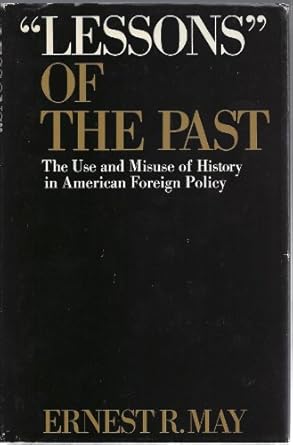The final chapter of "Lessons" of the Past: The Use and Misuse of History in American Foreign Policy by Ernest R. May is titled "Tasks for Historians". (See my posts on Chapters I & II, Chapters III and IV, and Chapters V and VI.)
Professional historians (PhD trained, doing original historical research, teaching at the university level, and writing for an audience capable of peer review) have specialized understanding of historical analysis -- understanding that May likens to that of professional scientists or economists within their professional fields. I would agree.
May suggests that people involved in U.S. foreign policy need to know about the history of the countries (and regions) with which they are dealing, about U.S. history, about the history of foreign policy and foreign policy making, and about the operations of the U.S. government. The book, taken as a whole, suggests that they also need to understand comparable historical situations to those in which they are currently making policy decisions.
I recently watched a news report suggesting that nominees for ambassadorial posts need some instruction in history of the country in which they are to serve before their Senate hearings. People taking new posts dealing with a specific foreign country or region probably should study the relevant history before and after taking the post. May also suggests that people taking positions in the federal government should learn about their department's history and the history of policy making in government as they prepare for their duties. I would suggest that people preparing to represent the USA in some area of foreign policy might be expected to know about U.S. history. And of course, May emphasizes that people making important foreign policy decisions need to know about the relevant history to that decision, and about historical precedents that might inform that decision.
May seems to focus on military, political and economic history and of course these are all important. However, many specialists working in the international field need to know history relevant to their own fields. Thus environmental history, the history of health and health services, agricultural history, engineering history, industrial history, and the history of financial services are examples of histories that may be relevant to foreign policy.
Of course, history books are a key resource for those wishing to learn history. It might be that every person working in foreign policy should have a tablet and use it regularly to read history. I have used the CIA World Factbook frequently, and the country studies (now somewhat dated) available from the Library of Congress. The State Department maintains a training center, and there are other government training facilities available to people in foreign policy posts. I would suggest that a lot could be done with online courses, both of the Khan Academy type and like those provided by Coursera.
Based on a couple of decades of experience strengthening the use of science and technology in USAID, it would suggest two other approaches:
- Bring young and mid-career professional historians into the agencies on fellowships and exchanges. These people will earn their keep helping with the work of the agency. They will recognize situations in which professional historical skill and understanding will be useful, and if they find significant numbers of such situations, the use of historians will increase.
- Create a process by which panels of historians can provide professional advice, comparable to the peer review process and the scientific advisory process used in the federal government.

No comments:
Post a Comment